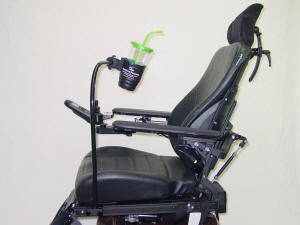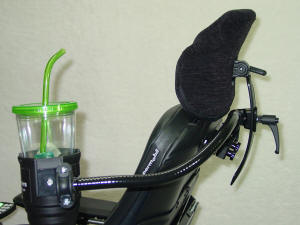Mealtime Partners, Inc.
Specializing in Assistive Dining and Drinking Equipment
July 2016 Independent Eating and Drinking Newsletter

|
July Topics:
|
||
|
Mealtime Partners Home Page Send a Comment or Suggestion |
|||
| Subscribe to Newsletters |
Hot Weather Reminder About Adequate Hydration
Each year Mealtime Partners reminds our Newsletter readers about the need for adequate hydration during the summer when temperatures are high. Infants, the elderly, and those with disabilities are all particularly vulnerable to dehydration due to increases in temperature during the summer. Additionally, it should be noted that during warm weather, people spend more time outside and can become thirsty or dehydrated more easily. It is always better to drink too much water and make frequent visits to the bathroom, than to ignore thirst and experience any level of dehydration. The following article combines information that has previously been published but is very important to remember and worth revisiting.
Medical treatment for rehydration is estimated to have exceeded $5 billion in the U.S. in 2004. If these costs are projected to a 2016 population base, it is an enormous medical expense that could be significantly reduced with preventative treatment.
Approximately 70% of our body weight is water that is in our cells, our blood and the space between cells. Water is constantly lost from our body and must be replaced by drinking. We drink, we use the restroom, we perspire, etc. It is a constant cycle. However, the majority of people in the United States do not drink enough fluids.
Thirst is how our body indicates that the fluid in the body is out of balance (i.e., too low). Humans and animals have the innate ability to know when they should drink; however, many people routinely disregard the messages about drinking that their body sends them.
Because medical costs are skyrocketing, there is a movement towards providing preventative medical treatment to reduce overall medical costs in the United States. Many health conditions, if treated appropriately on a regular basis, can be managed without hospitalization or the need for emergency treatment, but if neglected can become life threatening. Some examples of these are diabetes, high blood pressure, and some heart conditions. However, something as simple as adequate hydration is often overlooked as a significant health issue that is essential for ongoing good health.
If dehydration is not treated it can have a very serious medical impact. The first signs of dehydration are a headache, dark yellow urine, reduced or lack of sweat, nausea and/or vomiting. Should dehydration worsen, symptoms will escalate to altered mental status, fatigue, sleepiness and depression. If left untreated dehydration can be life threatening.
Dehydration is an ongoing problem for many people, especially those with disabilities. It is responsible for health problems such as urinary tract infections, kidney problems, skin tissue deterioration, and headaches. All of these conditions require medical treatment that, in some cases, can be protracted, require hospitalization, and thus be very expensive.
In most cases, dehydration is preventable! However, it takes a vigilant caregiver to offer a drink on a regular schedule to keep someone who cannot drink by themselves adequately hydrated. This is a difficult task when a caregiver is undertaking many care-giving responsibilities. Often, what happens is the person is offered a large drink, infrequently. This introduces an element of risk to the health of the person. When drinking a large quantity of liquid at a time, the person drinking may take a sizeable volume of liquid into their mouth at one time, and swallow repeatedly to clear all of the liquid from their mouth. With each swallow, within the sequence of swallows, the risk of choking or aspiration increases. Therefore, because of the added risk, this is a poor method of avoiding dehydration.
For most people, a drinking system can be made available to them even if they are unable to hold or lift a cup. Regardless of this easy solution to avoiding dehydration, Medicare, Medicaid, and private health care insurance providers consider drinking systems as “aids for daily living” and do not cover their cost. However, they do cover the cost of an emergency room visit and/or hospital stay that was brought about by dehydration. According to the Agency for Healthcare Research and Quality (AHRQ), about one in ten of the nearly 40 million hospitalizations in 2008 were potentially avoidable. Dehydration was among the conditions for which hospitalization was avoidable with the appropriate outpatient care.
Additionally, according to the National Pressure Ulcer Long-Term Care Study (NPULS), dehydration was associated with a 42% increase in risk of developing pressure ulcers in nursing home residents. The estimated annual cost for treating pressure, or decubidus, ulcers in the United States is $1.3 billion.
Mealtime Partners provides hands-free drinking systems that can be mounted on a wheelchair, bed or table, and make water available to users throughout the day and night. For more information about these drinking systems, click here.
| Ideal for People on the Go! | |
| The Front Mounted Drinking System can accommodate most cups and bottles. Therefore you can have a cup of coffee, a bottle of water, or a soda simply by changing out the container. The cup holder can be used with a koozie in it, or by simply putting the container straight into it. | |

|

|
|
Front Mounted Drinking System for UniTrack mounted on UniTrack rail below seat |
Front Mounted Drinking
System for UniTrack mounted on UniTrack rail below headrest |
|
The black Flex Arms that hold the cup holder come in lengths from 6 inches to 30 inches in 6 inch increments. They can be bent to position the cup holder in the most accessible position for the user. Once bent they will hold their position until they are readjusted. The Front Mounted Drinking System is like buying a custom drinking system! To see all of our drinking products, click here. For more information about the Front Mounted Drinking Systems for manual wheelchairs, click here. For more information about the Front Mounted Drinking Systems for wheelchairs with UniTrack rails (as pictured above), click here. (The drinking systems for both types of wheelchairs are identical. Only the method of clamping to the wheelchair is different.) |
|
To continue the subject of issues that should be kept in mind during the summer months, this article will discuss hyperthermia. Everyone is vulnerable to the danger of hyperthermia but it is a more significant risk for the elderly, very young children and infants, and those who are ill or who have chronic medical conditions and/or disabilities.
Hyperthermia occurs when the body is not able to dissipate the heat that it is absorbing or producing. Typically, it occurs during very hot weather when the body becomes overheated and is not able to reduce its core temperature in the typical way that body temperature is regulated: perspiring, drinking cold fluids, getting into an air conditioned environment, etc. If the body is not allowed to cool down, the result can be heat stroke. Sudden onset of dizziness can occur when someone has been out in the heat too long. Also, muscle cramps and significant fatigue can occur. It is very important that if any of these symptoms occur that the individual is quickly moved to a cooler environment. It is especially important to move them out of direct sunlight.
For those who do not have air conditioning in their home, it is wise to go to a building that is air conditioned, particularly in the heat of the day. People who have limited mobility may require assistance to be able to go to a cooler location. Public transportation is available in many communities and pick up and drop off can usually be arranged for those in wheelchairs or who have limited range when walking. Most communities have a place that is available to go to for them to cool off. Many senior centers offer recreational activities where individuals can pass the time in a cool environment. If no such facility is available, malls are always cooled and movie theatres are also a good place to spend an hour or two.
The risk of hyperthermia increases as people age. For many of us as we grow older our circulation and sweat glands become less efficient and this increases the risk of hyperthermia. Also, being significantly over or under weight, drinking alcohol, or taking certain medications can increase the risk. An additional contributing factor for people who have difficulty moving around is that they tend to limit their intake of fluids so that they don’t need to get up and go to the bathroom as often. This behavior contributes to the development of hyperthermia and also urinary tract and bladder infections. Therefore, despite it being a nuisance and possibly difficult, the consumption of liquids should never be restricted in day to day life just to lessen the number of visits to the bathroom.
Heat stroke is a dangerous form of hyperthermia and happens when the body is unable to bring down its own temperature. Once the body loses the ability to reduce core temperature, the person’s temperature rises. The accompanying symptoms are a rapid, strong pulse, dry skin (no sweating), flushed skin, confusion and/or aggressive behavior, unstable footing or wobbliness, and even fainting. When heat stroke occurs, immediately get the person into a cool environment. Put cold, wet cloths on their wrists, neck, armpits and groin, to cool them down. Blood flow is close to the surface of the skin at these locations and thus the blood temperature can be reduced with the application of cool cloths. If they can drink without choking or vomiting, provide cool liquid. Have the person lie down. It is advisable to seek urgent medical assistance if heat stroke occurs.
Throughout the world, hyperthermia happens during the heat of the summer. For low income families it is difficult to afford to pay for the electricity to run air conditioners or fans. In the U.S., the Low Income Home Energy Assistance Program (LIHAP) that is part of the U.S. Department of Health and Human Services helps eligible households pay for home cooling and heating costs. For more information about this program, click here.
Maintaining good hydration during hot weather is wise for everyone. However, for those who are unable to help themselves to a drink whenever they feel the need, maintaining a well hydrated body becomes more difficult. Asking for a drink all of the time becomes a burden for both the consumer and care provider. To help alleviate this situation, Mealtime Partners offers a selection of drinking systems that can be accessed without the use of hands. One of these systems may provide an easy solution to avoiding dehydration during hot weather. For more information about these drinking systems and considerations for selecting the appropriate system, click here.
| Did You Know? Did you know that senior citizens are more likely to fall as they grow older? The neurons in their feet lose their sensitivity and are less able to control their balance, thus falls are more likely. Engineers at Harvard’s Wyss Institute have discovered that random vibrations to the feet can improve balance and motor control. They are currently working on an insole to fit into shoes that will provide vibrations. The question is whether to market the insoles through the same channels as other insoles (sporting goods stores, foot wear companies, etc.) or to seek FDA approval and market them through durable medical device companies. Regardless, of how the insoles are eventually marketed, they may be able to reduce the falls experienced by people as they age. For more information about this topic, click here. |
Mealtime Partners Website Navigation:
Home | Dining | Drinking | Videos | All Products | Warranty | Ordering | Calendar | FAQ | Newsletters | Contact
Please send comments and suggestions to newsletters@mealtimepartners.com
Copyright © Mealtime Partners, Inc. 2016
All rights reserved.